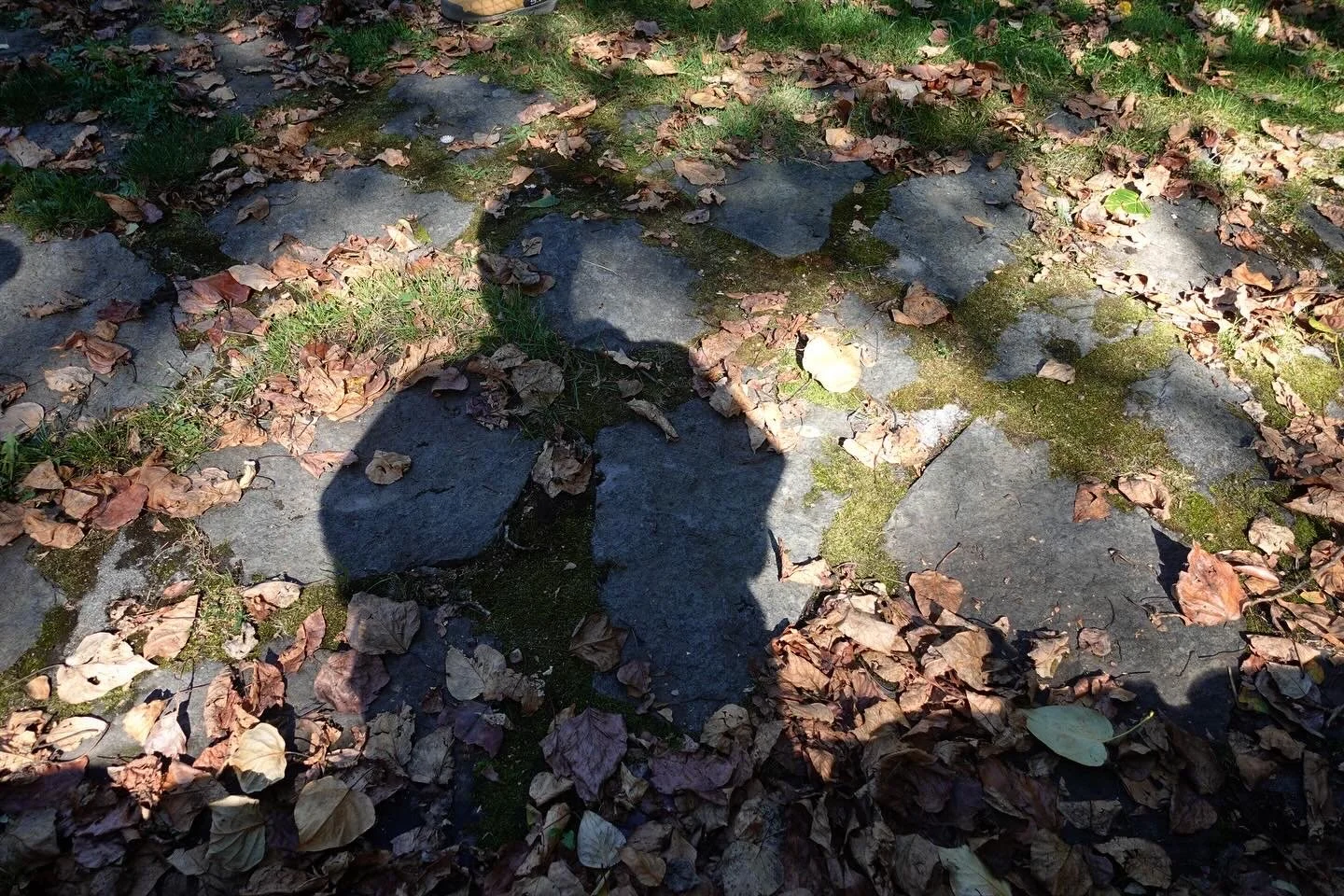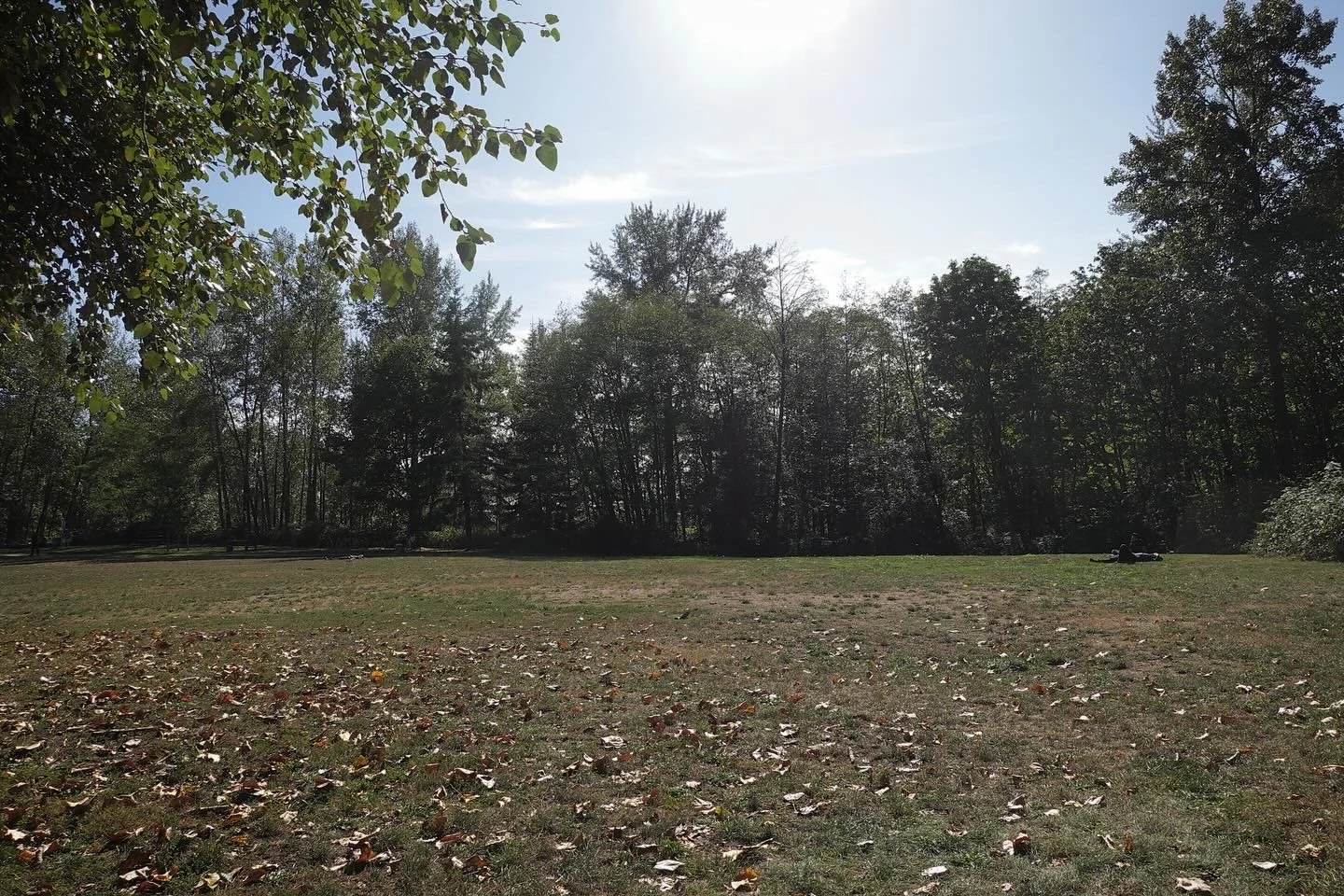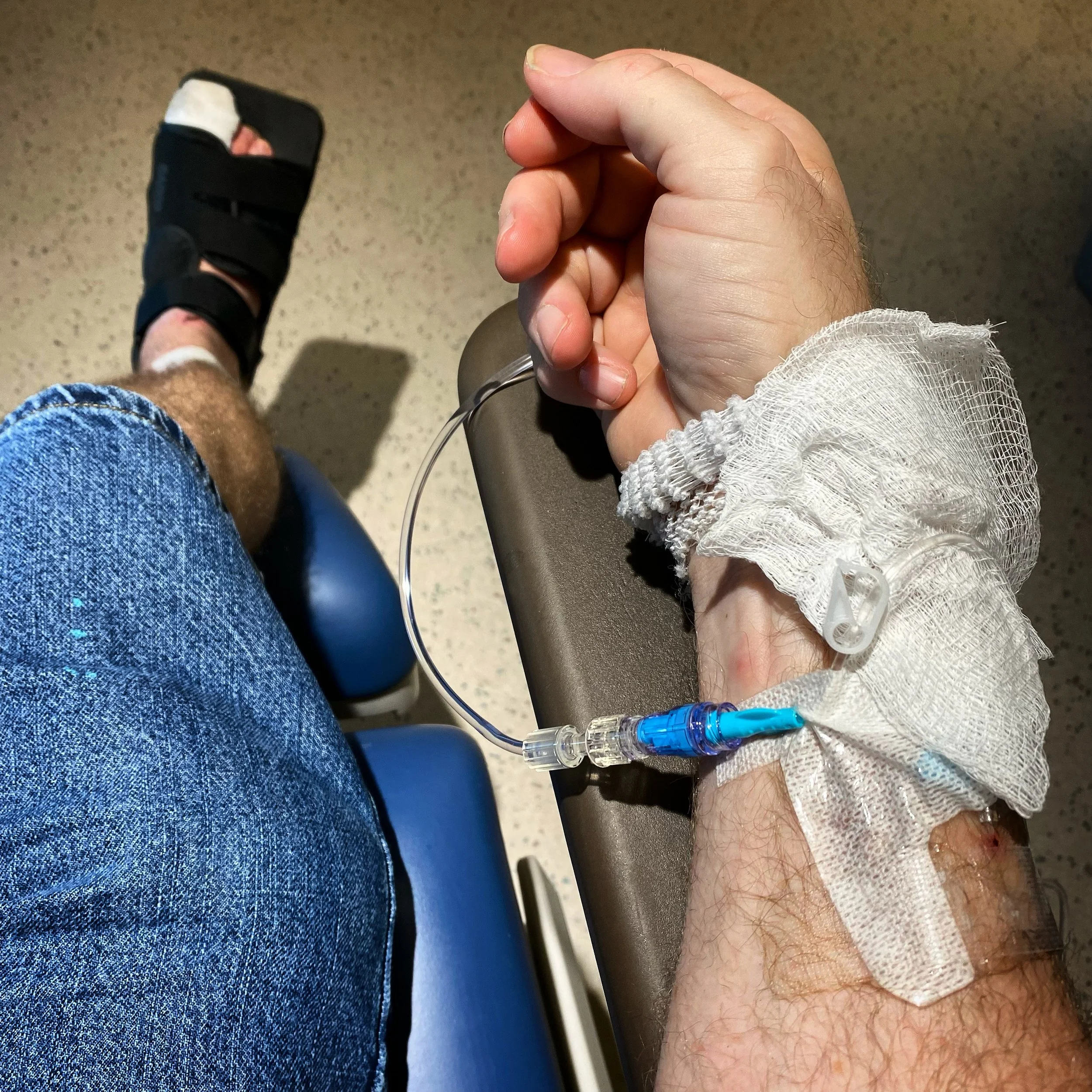These photos were also posted on Flickr and Instagram.
WEEK 02 - CLASS EXPRESSION
ON THE TOPIC OF LONELINESS: I arrived at this week’s walk, the first walk of the semester, right at the last possible minute. Somehow, I slowly slid my SUV into the last possible spot that could serve as a safe harbour for my vehicle. I stumbled out of my vehicle, heading towards the group of gathered students, all standing in a circle, intently listening to our esteemed professor, Dr. Ross Laird, who had already been discussing today’s route. The narrow lot and the area where we stood primarily lay in the shade of the tall trees that lined Kittson Parkway, an odd offshoot of 64th Avenue, which was likely created to save the residents of 64th Avenue from having to sit directly alongside the daily deluge of traffic that moved to and from the 91 and 99 arterial highways.
I remember the pang of nervousness that sat within me as the group got underway. My feet, wrapped in bandages, and my right foot rising slightly higher than my left thanks to the offloading footwear I’d been wearing. Slivers of light pierced the canopy of the forest we moved through, along curated gravel paths and other narrow trails that were likely created by the regularly random footsteps of other trail goers as well as those on bicycle too.
My second girlfriend, Sheri Smith, had lived nearby the Watershed on Bond Boulevard, so the Watershed was a place we visited with some regularity during our short time together as a couple. I remember how she had once convinced me to bring my bicycle from Vancouver so we could explore the trails together. Hopelessly in love, as so many young men are want to be, I had kept quiet about my bike not having any working gears, which was fine for doing the flat seawall everyday but not so great for the times when the undulation of hills were involved, especially those that went uphill. I still know Sheri, we’ve kept in touch over the last twenty years. Before COVID, she had met a man she was set to marry, and they had a child together, a cute girl they named Athena. Then, something happened - some kind of betrayal Sheri has never shared, and she was single for a long time, raising Athena on her own, with the help of her parents. This year, she met someone new, and they look very happy together. And I can’t help but feel a little alone when I see her posts online. A little jealous, even though I have zero desire to be with her again, I miss the idea of her, of a relationship, of having someone in my life to do things with. To have a romantic relationship with.
The 2pm sun warms my face as it falls around me, blanketing the bench I’m seated on, and the field that surrounds me. Two dragonflies glide effortlessly like the tiniest of kites off in the distance, illuminated by the light against a backdrop of dark greenish black shrubs and trees. Ross has encouraged us each to be alone in this moment, to sit with it, and be with it. For better or for worse, being alone has been something that’s grown on me, it’s something I can do. For example, I’m perfectly capable of eating a prime rib dinner at The Keg alone, making small talk with the waitress, falsely telling myself how we could so easily fall in love, like a million other guys have told themselves across the life of her job serving them all the finest of meals, in the hope they will leave her a bigger tip that will help compensate for the lousy pay of her employer. I can move from movie theatre to movie theatre alone in a multiplex, seeing four or five movies alone. I can walk through nature alone, breathing in the warm air of a sunny day, or the cool air of a drizzly one. Brian Alba, in his book, THE POWER OF BEING ALONE, echos the ideas explored by Dr Laird in his TEDxTALK, BIG PROBLEMS: SMALL WONDER when he explains how:
“The power of being alone is a book in which you will discover that the moments you spend with yourself will be your best allies to improve your life; it is in those moments of meditation and reflection that the greatest dreams and plans to achieve them are born.”
So I get this, and ultimately I think that for me, it’s not the being alone that bothers me, but the loneliness that springs from it.
In a May 26, 2023 mental health commentary for Forbes called “Nearly 3 in 5 US adults are lonely - and it could be one of the biggest under the radar issues the economy is facing,” loneliness researcher Cindy Jordan describes how:
“Millions of Americans are suffering from a deadly, expensive health issue–one for which we have no vaccine, immunity, or quick cure. It’s loneliness –and it quietly permeates every level of our society. Each year, loneliness costs families, the healthcare system, and businesses hundreds of billions of dollars.
To begin to tackle loneliness, it’s critical to understand it. Loneliness doesn’t necessarily mean that one is physically separated from others. It’s an all-consuming belief that one is socially isolated and cannot form meaningful connections with others.
It’s a shockingly common issue. Nearly three in five U.S. adults are considered lonely, according to data from Morning Consult. Underrepresented racial groups and people with low incomes are particularly likely to grapple with loneliness.
While loneliness lurks below the surface, it produces outsized health harms. Chronic loneliness rewires our brains and produces harmful inflammation. It fuels nearly every dangerous disease in the book, including high blood pressure, heart disease, obesity, depression, Alzheimer’s, cancer, and dementia. In fact, research has found that the health risks of prolonged loneliness are similar to those of smoking 15 cigarettes each and every day” (Jordan).
I first heard the cigarette smoking statistic in a book I read a few years ago, and it’s a statistic that’s burned itself onto the folds of my brain. I’ve always prided myself, in a kind of perverse egotistical manner, of being above so many others in the fact that I’ve never smoked cigarettes, drank alcohol, or experimented with drugs. Not even as a teenager. Instead, I fell into a cycle of anxiety and depression that cemented itself in me as a teenager, and stayed with me throughout my life. For me, it’s also manifested itself in the many physical maladies Jordan described. For over a decade now, my body has been plagued with the costs of binge eating; being overweight; struggling with high blood pressure; developing type 2 diabetes; and the depression. The fucking anxiety, social awkwardness, and depression. The inability to take responsibility for my life, the inability to make responsible choice.
I’ve sometimes fooled myself into thinking it’s a battle only I have suffered through, but then the foggy curse of my ego lifts as I come to realize that it’s something that others suffer through too. Simone Hung, in her book “Let’s Talk About Loneliness: The Search for Connection in a Lonely World” describes this shared experience as a “secret loneliness pandemic” ( Hung 103), and she notes how “…loneliness creates a cycle, leading to more isolation… (as well as) social awkwardness” (104). Finally, Hung also cites Dr James Coan, Director of the Virginia Affective Neuroscience Laboratory at the University of Virginia, who states that:
“What happens when you’re lonely is that you become starved. It’s like being malnourished. You are constantly running in a kind of deficit with that bioenergetic resource. And so, your brain starts looking for ways to not spend any energy. So, you sleep all day, you avoid anything that seems like it might cause you another stress, response, and that avoidance becomes a cycle, and you become isolated.
We are lonely, the stakes become higher, and what we do is paradoxically, hold people to higher standards, even though we need people desperately. We require more evidence that they are going to be there for us. And that Keeps us trapped in a cycle of loneliness, because we hold very often to a higher standard thing is reasonable” (Coan 104).
In particular, it’s Dr Coan’s description of avoidance, and sleeping all day, which resonates deeply for me. The bed at my Mother’s rancher has become a kind of sanctuary for me, one in which I’m barely hanging onto anymore. It’s unmade, although the blankets get washed regularly. I have my spot on this Queen sized mattress which sits on a mahogany Gibard bed frame which also holds together a mahogany headboard and footboard, complete with four pillars on each corner: a four poster bed to be specific. And my dog has her place to, on the lower right hand corner of the bed, curled up on a blanket of her own, positioned far enough away from my head that releases a terrible buzz saw snore whenever I’ve drifted off to sleep. An area of refuge, where I lay too often. I want to claim I’m disconnected from my sadness here, but I’m not. The loneliness and depression are still with me even there - it’s something that’s a part of me like breathing. It’s something I fear I can never let go of.
VIDEO > Psych2Go. “6 Incredible Traits of People Who Like to Be Alone.” YouTube, 12 Dec 2023.
It’s funny how at the end of the semester, the Psych2Go YouTube channel released a video on being alone. It circles back to the importance of finding time to be alone, a subject I had posted about on a Twitter-X thread where user @whitneyparfait_ said (in response to @npreeko’s comment, “no communication for hours is a true turn off”):
in the tapestry of interaction, it's the threads of continuous dialogue that weave the richest connection
when these threads are cut, even for hours, the silence can loom large and heavy, casting shadows over the shared warmth of constant communication, leaving hearts in a quiet yearning for the comforting rhythm of a familiar voice
In many ways, they are right, but I don’t think we should ever get worried about not hearing from someone we care about for a few hours. It doesn’t mean they are cheating on us, it just means they’re living life, or worse, their smart device’s battery died. But outside of a few hours, or a weekend, when someone goes quiet for longer periods of time, then it can be justified to worry that they are okay. But specifically, I responded to @whitneyparfait_, explaining:
WEEK 02 SUBVERSIVE SELFIE PROJECT POSTS (OHM WORK)
Over the last week, I only managed to complete one subverted selfie post on Instagram, as follows…
SEPTEMBER 13, 2023 SUBVERTED SELFIE PROJECT POST
September 13, 2023: Today marks day 31 of my daily IV regiment. I still get to do this for at least 11 more days. When they redo my bandages, my big toe still looks swollen, but the nurses take measurements of the wound’s circumference & depth, & they assure me it’s getting smaller. I can’t look when they measure the depth, they use some kind of small, white, plastic rod - pressing into the middle of the wound, to take a measurement. The fear I might have to have some of my toes amputated seems to have subsided. But today my right foot has had pain shooting through it as I walk, even with my offloading footwear in place as I hobble around. I haven’t taken any of the strong prescription painkillers they gave me in over a week but I think I may down one when I get home.
Today’s been a long day. I was up past 1am cleaning Mom’s garage, which I’ve allowed to get very unorganized in recent years. I filled up our two recycling bins, plus our garbage bin. Two of her neighbours, who are away, gave me permission to use their bins if needed, so in addition to Mom’s, I filled a third recycling bin, & a second garbage bin belonging to one neighbour, & I got from the other neighbour, a fourth recycling bin half full. The main motivation in doing this was to clear space so Mom’s old washing machine & dryer could be taken away, & new ones installed. The new ones look like something out of one of the new Star Trek series. The two Samsung units are black, sleek, with minimal lines, no curves, & perfectly circular, but flat doors. You can even pair the units to your internet connection & control them with a smart device.
I missed my first Art History class though, waiting for the delivery people who came right in the middle of their delivery window of 11am-4pm. I had gotten up at 6am & worked until they came, to ensure they had lots of space. I still have a lot to organize but a huge chunk is done. It’s a start to something I should have done a long time ago.
Tomorrow, I need to make an appointment with my doctor for my physical, & I also need to reschedule an appointment with my psychiatrist who I missed yesterday because I slept in. Aren’t I the responsible one?
(256/365).
END OF WEEK REFLECTION
ON THE TOPIC OF CONSISTENCY (GETTING THINGS DONE): In looking back on the week - I never did make an appointment with my doctor (even at the semester’s end - I haven’t made the appointment). My ability to see things through has really weakened over the years, to the point of embarrassment.
Dr. Srini Pillay, in his short course on LinkedIn Learning called MANAGING DEPRESSION INTHE WORKPLACE describes how it’s important to become active about how one responds to their depression. He encourages people to get out of bed each morning, as it’s simply too easy to stay home and in bed when one’s depressed. For Dr. Pillay, one should COPE ACTIVELY, LIVE ACTIVELY, and PARTICIPATE IN SOCIAL LIFE. Specifically, he states how,
“Coping actively means being proactive about understanding and treating your depression. Read as much as you can to educate yourself about the many types of depression, and treatment approaches as well.”
He continues, noting how:
“Living actively means the opposite of what you are motivated to do. It involves getting outside, walking, going to the gym, or going for a bike ride. Ignore the tiredness that comes with depression. Get dressed every day, set small goals every day.”
And he also describes how:
“ Participating in your social life means talking, which helps share your feelings. People who care about you will appreciate what you’re going through. Keep a journal to track your current state and recovery. Because when you take care of yourself, bit by bit, things become more manageable.”
What Dr Pillay described is what Dr. Temple Grandin also described, during an interview with Dr. June Gruber in a #talkmentalillness workshop offered on the Coursera platform in 2021. Specifically, Dr. Grandin emphasized how during the COVID lockdowns when people primarily worked and went to school from home:
“I got to get up in the morning, get dressed, get ready for work by eight, no slouching around in my PJs. I’ve got the same clothes on that I’d wear as if I was coming to your meeting. I dress for work. I’ve seen some very casual dress on these video conferences, and I’m going, ‘really people?’ Yes you are going to have kids interrupt things, that’s going to happen, and it’s fine to have your pets interrupt things, but get dressed for work.”
And these ideas are super important for me to actualize in my own life - especially as someone who wants to pursue a fairly self-directed career writing, creating fine art projects, and exploring spirituality. Too often over the last decade, I’ve let myself fall into a paralysis related to my anxiety and major depression, and it’s resulted in me not getting things done. It’s resulted in me falling behind in life and it terrifies me that I haven’t been able to pull myself up better.
VIDEO > CU Boulder College of Arts & Sciences. “#talkmentalillness interview with Dr. Temple Grandin on autism spectrum disorders.” YouTube, 12 Jan 2021.
In September 2021, I was hospitalized after a suicide attempt. I spent several days in a lockup tank under 24-hour observation at Peace Arch Hospital before being transferred to the mental health unit at Abbotsford Regional Hospital. There, I met a young woman, who had just been diagnosed with Borderline Personality Disorder (BPD). We spent a whole day colouring and talking about our situations. She had a lot of handouts on BPD that she let me read. Later, after getting out of the hospital, I continued reading, learning, and journalling about BPD, and one thing always stood out for me was something Dr. Jordan Peterson said, in a BIte-Sized Philosophy YouTube video called JORDAN PETERSON - BORDERLINE PERSONALITY DISORDER (BPD) as follows:
“The borderline seems to be able to strategize, and to abstract, but not to be able to implement. And so, the intellect per se seems to be functional, but it’s not embodied in action. So it can be frustrating to be associated with someone who has BPD because they can tell you what the problem is, and even tell you what the solution might be, but there’s no implementation.”
I want to actualize a better, more healthy and responsible life. But how do I actualize this?
- END OF WEEK 02 -
This page is also available in PDF format.







